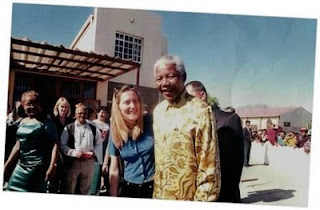SNEAKING A SHOT: Janet and Mandela in Lavender Hill, Cape Town, about 10 years ago. Picture: Richard Shorey
I want to get sentimental today and talk about a very old man close to my heart, and presumably yours too - Nelson Mandela.
Like America’s freedom fighter Martin Luther King, Nelson Mandela had a dream. Unlike Martin Luther King, Mandela lived to see his dream realized. In so doing, he inspired the world.
Mandela is the glue that holds the new SA together.
So the question I want to tackle today is the following: How can South Africa forge ahead without Mandela?
How do we build on the ideals of peace and unity that he helped to carve out of a country shattered by apartheid?
Mandela was released from 27 years in jail exactly 20 years ago today – on February 11, 1990.
That day, I reported the euphoria from the streets of Johannesburg as a journalist for the local newspaper. I feel privileged to have been witness to such an extraordinary event.
Many of you will have seen that seminal freedom clip – Mandela walking out of the prison gates, his fist in the air, his wife Winnie at his side. Some of you have seen it being re-enacted in the film, Invictus. And for those who haven’t, it is worth checking it out on YouTube. I watched it again this morning. Once again, it brought tears to my eyes.
Today, Mandela is frail, fragile and forgetful. In July, he will have 92 candles on his birthday cake. Rumours of his poor health circulate constantly, his office frequently putting out statements reassuring the public that Mandela is still very much with us. On this special day today, he made a rare public appearance in Cape Town just a few hours ago.
But the clock is ticking. The country can no longer rely on his influence to keep everything together.
Although South Africa has made progress in its freedom years, the signs of juvenile decay are a real threat if left unchecked.
So what does the country need to do to ensure that his legacy endures after he is gone?
Mandela’s party, the ANC, needs to get back to its core values – the values that Mandela is so famous for – justice, equality, unity, forgiveness and the fight against poverty.
After 16 years in power, there is an arrogance and complacency that has crept in to the ruling elite and which has led to corruption and abuses of power.
The party also needs to nurture credible leaders in its kindergarten, the ANC Youth League.
At the moment, the only name that keeps cropping up publicly is Julius Malema. He is a controversial hothead whose rantings have alienated many groupings, including women and whites. His comments are not helpful when rebuilding a deeply fractured country, which is one of the reasons why he is dressed in nappies in newspaper cartoons. The ANC may be nurturing other talent, but it should throw the names of other young rising stars into the public ring.
But it would be foolish to leave it up the ANC to be the torchbearers of Mandela’s legacy.
Opposition parties, civic society, business, trade unions, sports and artists groupings also have a responsibility to keep Mandela’s dream alive. Fortunately, we have a glut of talented leaders in many fields.
My profession cannot rest on its laurels. The media has a responsibility to challenge authority and defend the media freedoms we gained in 1994. Again, robust leadership is vital. Disillusionment will get us nowhere. We need bulldog reporters, independent editors and media owners prepared to invest in journalism that encourages debate, exposes corruption and highlights issues such as HIV-Aids, human rights abuses and poverty.
Mandela is a symbol of South Africa’s freedom. But he is also a symbol of reconciliation and forgiveness for the globe. He led the country to democracy at a time when horrendous human rights atrocities by one grouping over another were taking place in other parts of the world such as Bosnia-Herzegovina and Rwanda.
Mandela’s leadership – often expressed with humour and a smile - provided a ray of hope even among hardened cynics that peace is possible in the most trying of circumstances.
To many, the idea of a new South Africa is like Wonderland without Alice.
But we better get used to life without Tata, the father of the nation. He has passed on the torch, and it is up to all South Africans to keep the flame alive.
* This speech was presented by Janet to a Kennedy School of Government section class run by Professor Tim McCarthy on February 11, 2010..
MEETING MADIBA: My coy daughter Ella (coaxed on by her dad Steve Pike) meets Mandela in his home in Cape Town, about four years ago. In the bottom photo, my son Tyler presents a picture that he drew of Mandela being released from prison on 11 February 1990. The two excitable ushers are my father Tony Heard, and his brother Ray.



Great speech and blog posting, Janet.
ReplyDeleteYou were awesome on WGBH today, too!
An amazing time in South Africa...never to be forgotten...and what a legend that you were there to record it Jan....
ReplyDeleteLovely post, and congrats on your new blog.
ReplyDelete